With clear examples and explanations, the article demonstrates how ChatGPT can simplify and streamline the process of creating complex advanced MySQL queries, making it easier for users to interact with databases and retrieve the data they need. Whether you’re a beginner or an experienced developer, this article provides valuable insights into how ChatGPT can be leveraged to enhance your MySQL query writing skills. As one of the most practical AI coding assistants available today, ChatGPT helps developers save time and reduce complexity when working with databases.
Contents
- What is ChatGPT?
- What does ChatGPT do and how can it be used to interact with MySQL databases?
- How could ChatGPT help if you are CEO, CMO or Data Analyst?
- 10 examples of using ChatGPT to generate MySQL code
- What are the most popular film genres rented by customers?
- What is the average rental duration for films in the database?
- Which films are rented most frequently?
- What is the total revenue generated from film rentals in the first quarter of a specified year?
- What is the average rating for films in the database?
- Which actors have appeared in the most films?
- What is the average payment amount for rentals in the database?
- In which cities are films rented most frequently?
- Who are the top customers based on their number of film rentals?
- Which stores have the largest number of film rentals in the specified year?
- Limitations of ChatGPT
- Conclusion
What is ChatGPT?
ChatGPT is a highly advanced language generation model developed by OpenAI. It uses cutting-edge artificial intelligence and deep learning techniques to generate human-like text, and it is capable of responding to questions, generating stories, translating texts into different languages, and much more. Trained on a massive corpus of text data, ChatGPT provides instant and informative answers with remarkable accuracy and coherence, making it an indispensable tool for various applications and industries.
What does ChatGPT do and how can it be used to interact with MySQL databases?
- Query generation: ChatGPT can generate SQL queries based on natural language inputs, allowing users to retrieve data from a database without writing SQL code.
- Data analysis: ChatGPT can analyze data stored in a MySQL database and provide insights or summarize data in a natural language format.
- Chatbot interface: ChatGPT can be integrated with a MySQL database to create a chatbot that can answer questions or perform actions based on the data stored in the database.
- Automated reporting: ChatGPT can generate reports based on the data stored in a MySQL database and deliver them in a conversational format, making it easier for users to consume and understand the data.
How could ChatGPT help if you are CEO, CMO or Data Analyst?
If you are a CEO, CMO, or Data Analyst, ChatGPT can help you with databases in several ways:
Insight generation
ChatGPT can analyze large amounts of data stored in databases and generate insights that can inform business decisions and drive growth.
Reporting
ChatGPT can generate automated reports based on data stored in databases, allowing executives and analysts to stay informed and up-to-date on key metrics and trends.
Data visualization
ChatGPT can generate charts, graphs, and other forms of data visualization based on data stored in databases, making it easier for executives and analysts to understand complex data.
Chatbot interface
ChatGPT can be integrated with databases to create chatbots that can answer questions and perform actions based on the data stored in the database, freeing up executives and analysts from repetitive tasks.
Decision support
ChatGPT can provide decision support by analyzing data stored in databases and generating recommendations based on the said data.
Assistance with queries
ChatGPT can generate SQL queries based on the information provided by the user. This makes it easier for those not familiar with the SQL syntax to retrieve data from a MySQL database without having to write SQL code. For example, a user could ask ChatGPT to “fetch the names and email addresses of all customers who have made a purchase in the last 30 days,” and ChatGPT would generate the corresponding SQL query to retrieve that information from the database.
10 examples of using ChatGPT to generate MySQL code
Let us look at how you can use ChatGPT to create MySQL queries. For demonstration purposes we will use the sakila sample database and one of the best GUI clients for interaction with MySQL databases – dbForge Studio for MySQL. So, fasten your seatbelts, we embark on our artificial intelligence testing journey.

What are the most popular film genres rented by customers?
Suppose, we want to find out which film genres are most frequently rented by customers. Let us ask ChatGPT for help.
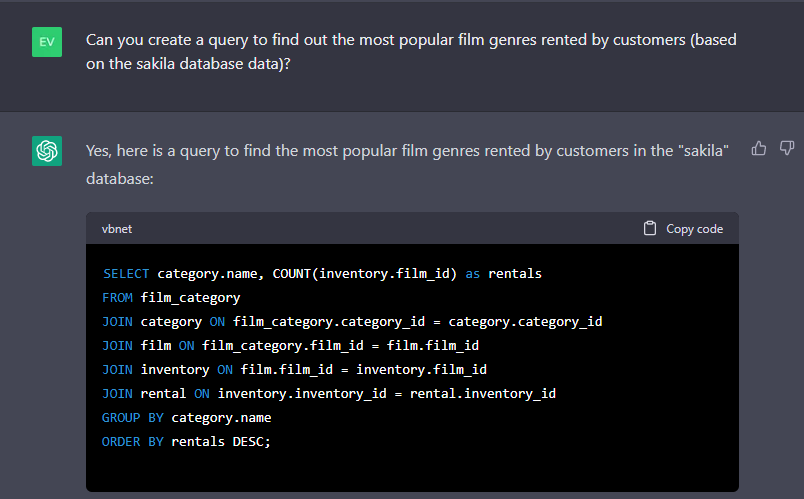
Okay, now let’s open dbForge Studio for MySQL and run the query that ChatGPT has created for us.

Unbelievable, right?
What is the average rental duration for films in the database?
So far, so good, let’s move on. Now we need information about the average length of time that films are rented for.
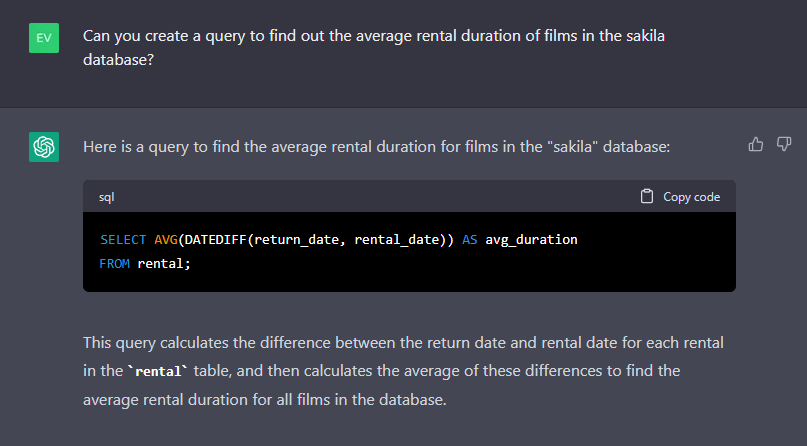
Looks convincing, let’s try to run the query, shall we?

As you can see, the query has been successfully executed, and we’ve been provided with the output.
Which films are rented most frequently?
Let’s go further and ask ChatGPT to create another query. This time we want to find out the most popular films in the DVD rental store, the ones that are rented the most frequently.
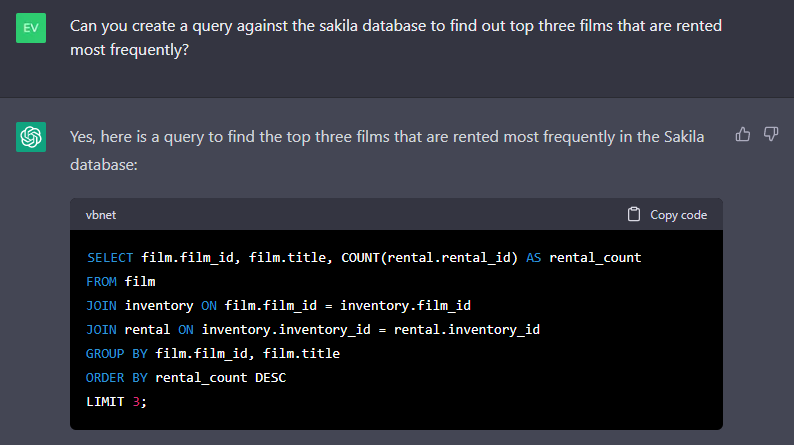
Let us execute the query with the help of dbForge Studio for MySQL.

What is the total revenue generated from film rentals in the first quarter of a specified year?
Let’s continue testing the AI capabilities. Suppose we want to quickly get information about the sum of the revenue the company has received from film rentals. So, we ask ChatGPT a question.
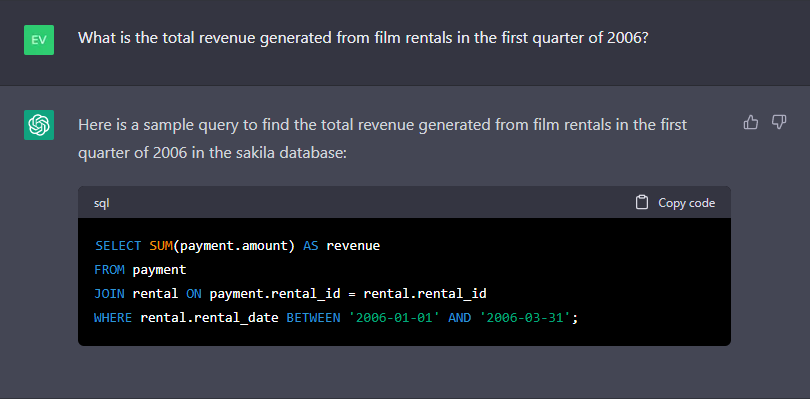
And it instantly produces a corresponding query. Let us execute it in dbForge Studio for MySQL.
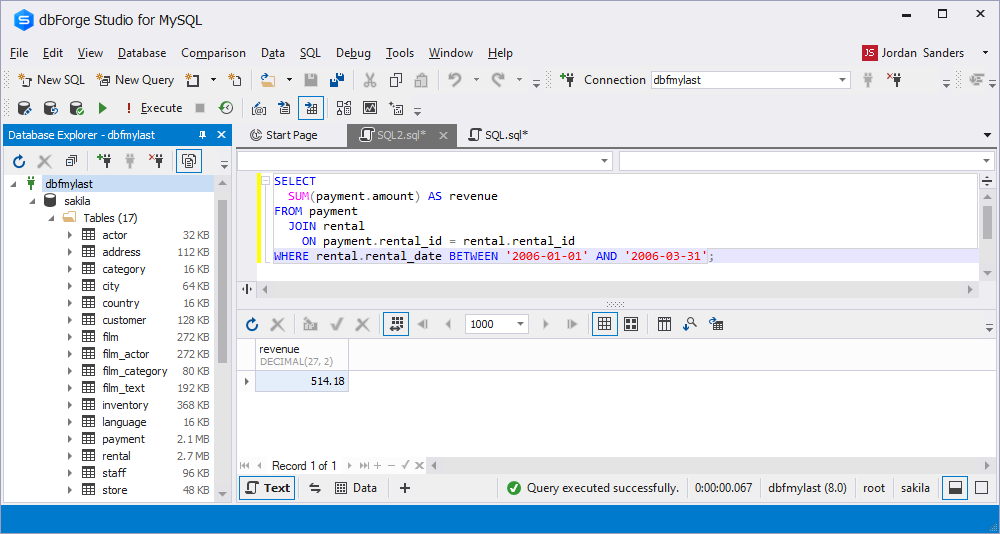
Impressive, right? Let us proceed.
What is the average rating for films in the database?
No issues thus far, let us keep going. Now we want to gain insight into the average rating for the films in our DVD rental store. Let us ask ChatGPT for help.
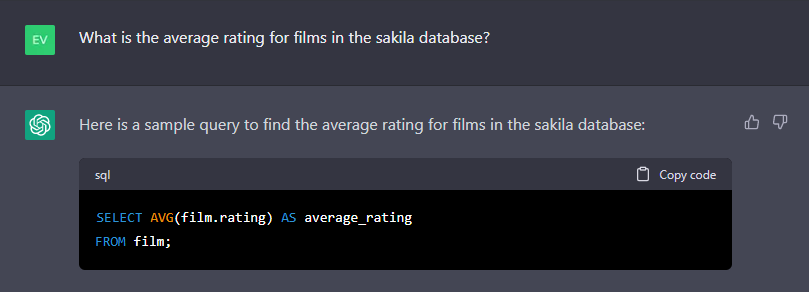
Let us check the output.
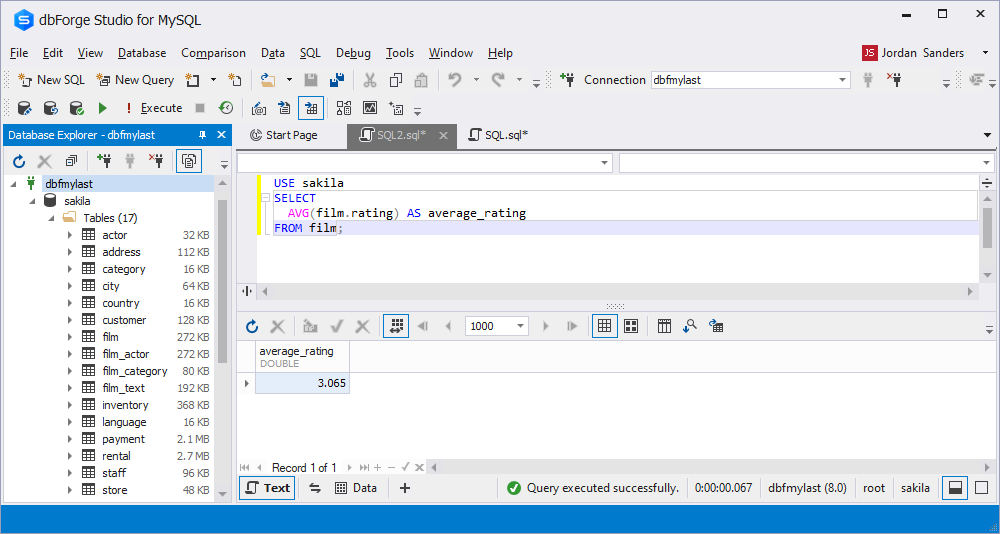
As you can see, the query has been successful. The average rating of the films is 3.065, which is quite average indeed.
Which actors have appeared in the most films?
What about asking ChatGPT to create a query to return a list of actors that have the highest film count? Shall we try?
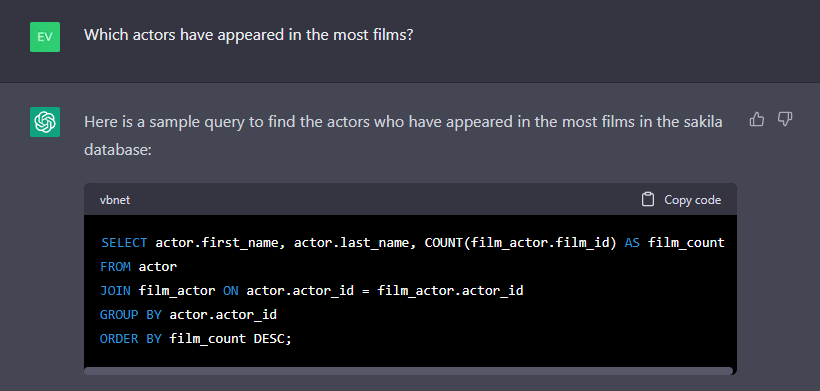
And again we run the query in dbForge Studio for MySQL to check the result.
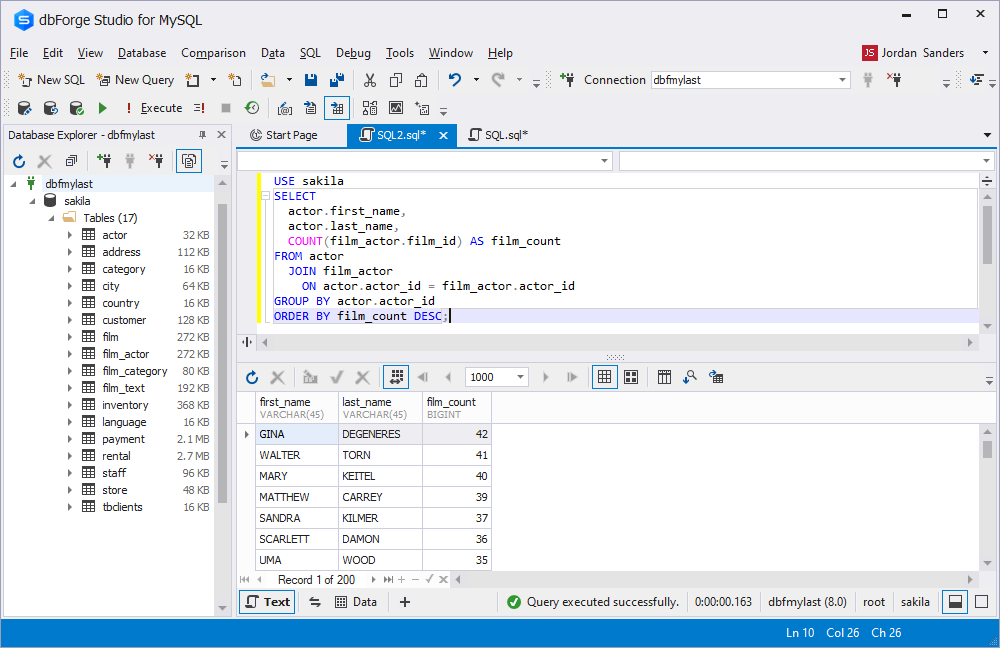
What is the average payment amount for rentals in the database?
Suppose that we need to analyze rentals and find out the average amount paid for rentals. Let us request ChatGPT’s assistance.
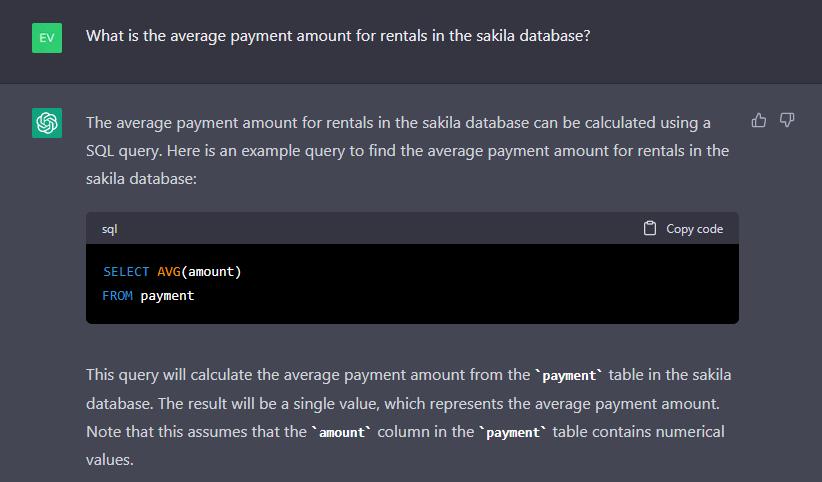
The answer is not long in coming. And now we check the query. And it is working! Amazing!
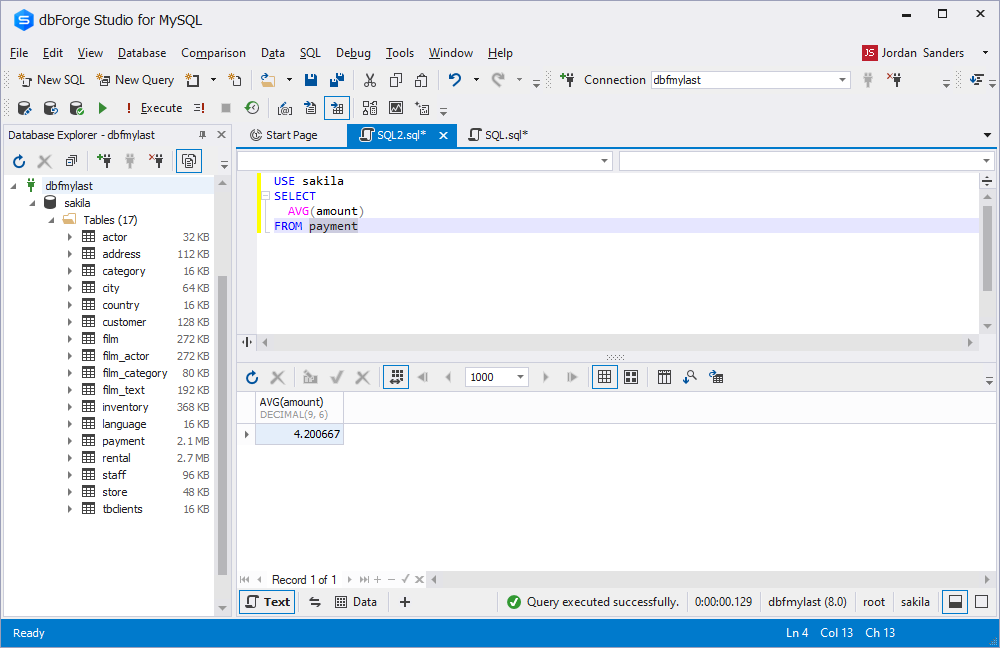
In which cities are films rented most frequently?
Okay, now let us ask ChatGPT another question. Suppose we want to get a list of cities where people rent films most often.
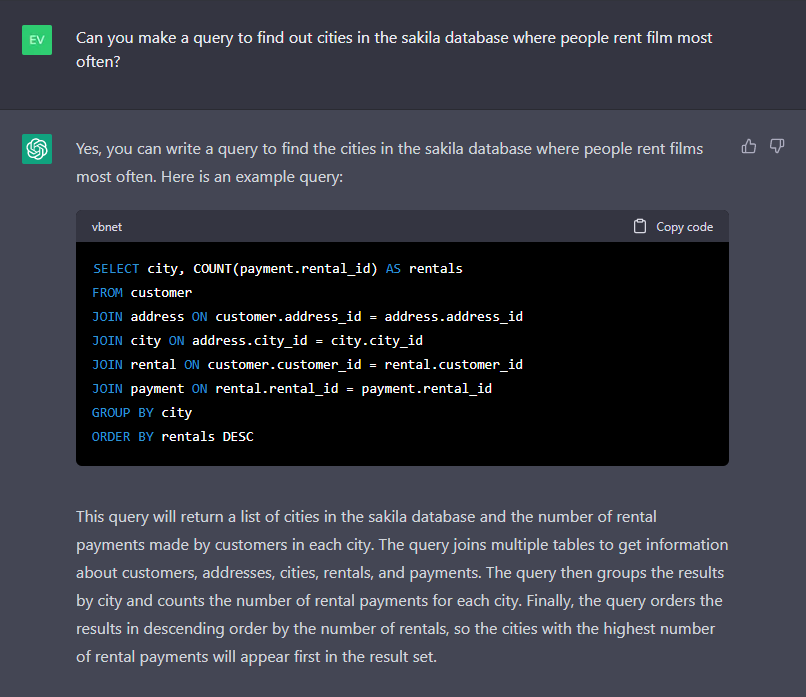
The answer is as quick as lightning. Let us check it in our GUI tool for MySQL too.
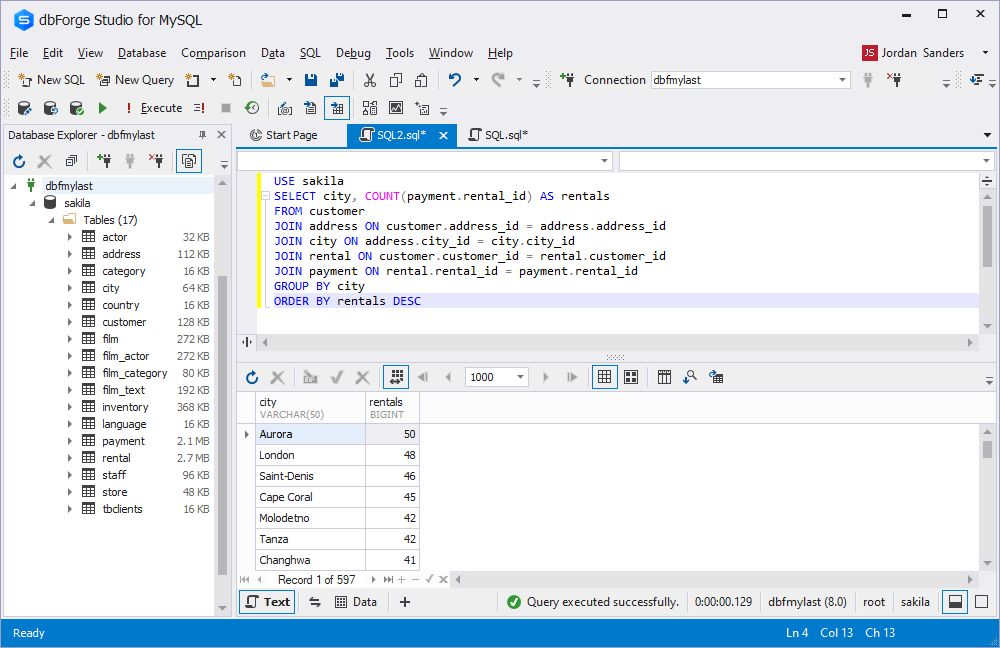
Who are the top customers based on their number of film rentals?
Let us now try to determine the customers who have the highest number of film rentals. We formulate a question and send it to ChatGPT.
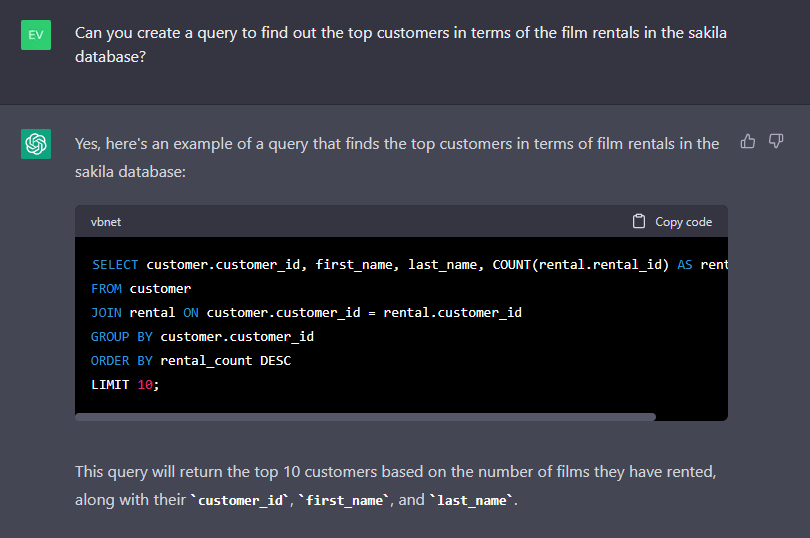
We get the answer in a matter of seconds. Let us check the query the AI has created for us.
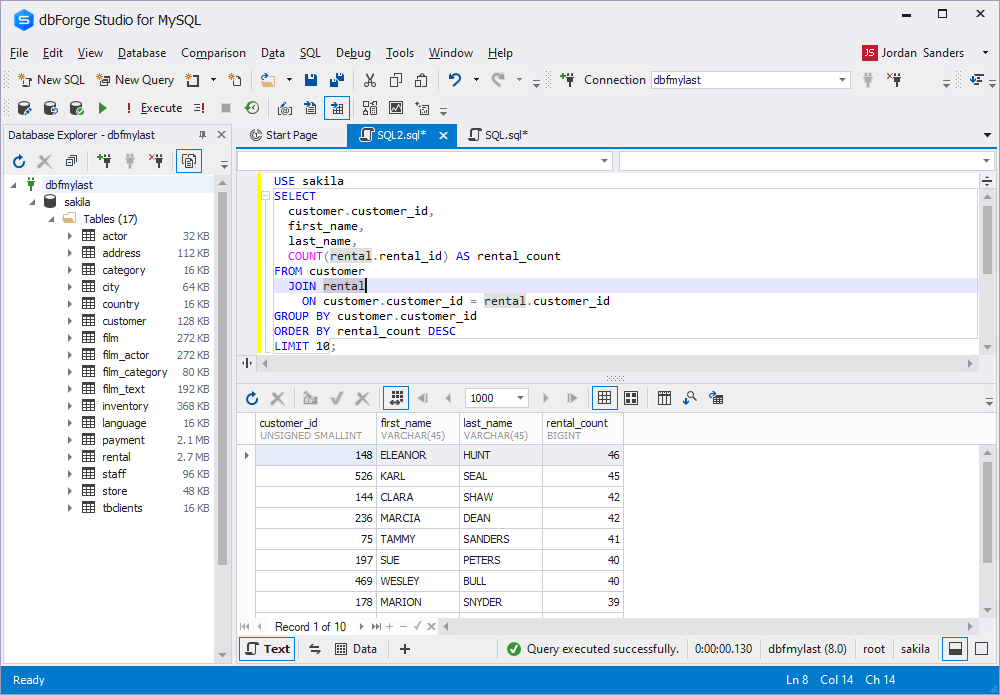
Which stores have the largest number of film rentals in the specified year?
Finally, here comes our last question to ChatGPT. Suppose that we want to gain insight into the stores with the highest number of film rentals in the year 2006.
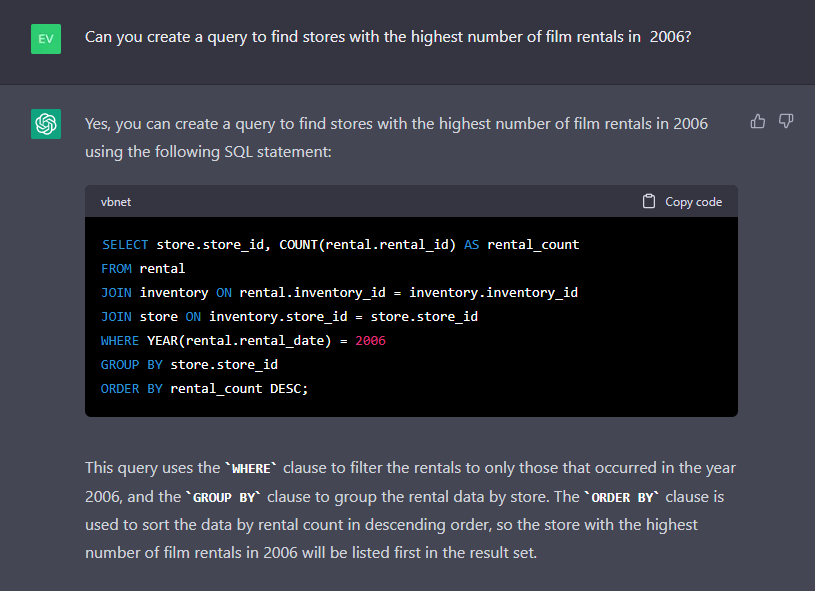
And as with the previous examples, we execute the ChatGPT’s query in dbForge Studio for MySQL.

Limitations of ChatGPT
ChatGPT has several limitations when it comes to generating SQL queries:
- Lack of database knowledge: ChatGPT may not have a complete understanding of the structure and relationships between tables in a database, making it difficult to generate accurate and efficient queries.
- Limited context: As with any text generation task, ChatGPT has limited context and memory, which may result in queries that are incomplete or do not take previous inputs into account.
- Syntax limitations: While ChatGPT has been trained on a large corpus of text, it may struggle to generate SQL queries that are syntactically correct and adhere to all relevant SQL standards.
- Ambiguity: SQL is a highly structured language, and even small ambiguities or typos in a query can result in incorrect results. ChatGPT may struggle to identify and avoid these types of errors.
- Security concerns: ChatGPT may not be aware of security best practices when generating SQL queries, and could potentially generate queries that expose sensitive data or compromise the security of a database.
It is important to note that while ChatGPT can be a great assistant when it comes to generating SQL queries, it is not a replacement for a human with a deep understanding of SQL and database design.
Will ChatGPT replace database specialists?
It is highly doubtful that ChatGPT will replace database programmers, analysts, or administrators in the foreseeable future primarily because it lacks the deep understanding of databases, SQL syntax, and data structures that is required to effectively program and manage a database.
Database programming requires a high level of expertise, including the ability to design and implement efficient and secure database systems, and to write and optimize SQL queries. ChatGPT can assist with generating SQL queries, but it cannot replace the critical thinking, context awareness, problem-solving, and expertise that a human database programmer brings to the table. In addition, ChatGPT is a tool that can be used to augment the work of a human database programmer, but it is not capable of independently managing a database or making complex decisions about how to optimize and secure a database system.
Therefore, it is unlikely that ChatGPT will replace database programmers, but it may be able to assist and augment their work in certain situations.
Conclusion
These are some examples of how ChatGPT can help executives, CMOs, and data analysts with databases. By leveraging its ability to generate human-like text and analyze data, ChatGPT can provide valuable support and insights to inform better decision-making. Using ChatGPT to build SQL queries can greatly streamline the process and make it more efficient. With its advanced natural language processing capabilities, ChatGPT can understand complex queries and generate the corresponding SQL code with ease. By the way, if you want to discover how to use ChatGPT to write SQL JOINs, you can refer to the How to Use ChatGPT to Write SQL JOIN Queries article.
If you’re seeking to enhance your MySQL database management experience, we recommend you download dbForge Studio for MySQL for a free trial. Discover the power and ease of using this advanced IDE to work with your databases and see the results for yourself. Don’t miss out on this opportunity to simplify your database management workflow.


